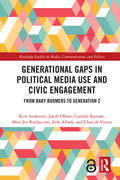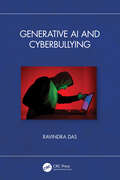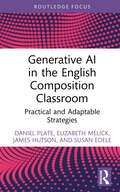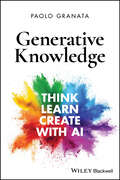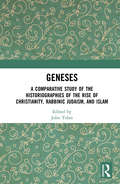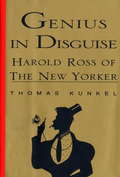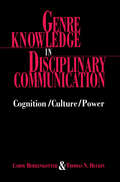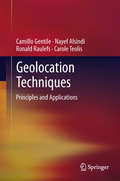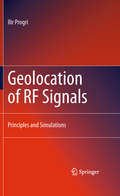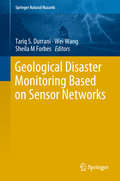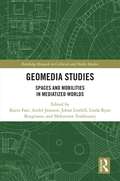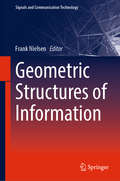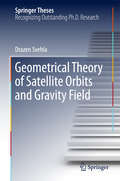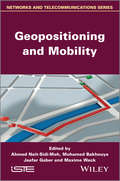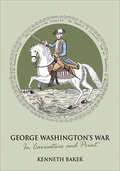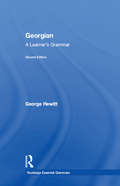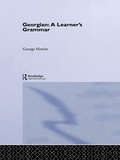- Table View
- List View
Generational Gaps in Political Media Use and Civic Engagement: From Baby Boomers to Generation Z (Routledge Studies in Media, Communication, and Politics)
by Erik Albæk Kim Andersen Jakob Ohme Camilla Bjarnøe Mats Joe Bordacconi Claes H De VreeseThis book investigates news use patterns among five different generations in a time where digital media create a multi-choice media environment. The book introduces a new model – The EPIG Model (Engagement-Participation-Information*Generation) – to study how different generational cohorts’ exposure to political information is related to their political engagement and participation. The authors build on a multi-method framework to determine direct and indirect media effects across generations. The unique dataset allows for comparison of effects between legacy and social media use and helps to disentangle the influence on citizens’ political involvement in nonelection as well as during political campaign times. Bringing the newly of-age Generation Z into the picture, the book presents an in-depth understanding of how a changing media environment presents different challenges and opportunities for political involvement of this, as well as older generations. Bringing the conversation around political engagement and the media up to date for the new generation, this book will be of key importance to scholars and students in the areas of media studies, communication studies, technology, political science and political communication.
Generations, Inc.: From Boomers to Linksters--Managing the Friction Between Generations at Work
by Larry Johnson Meagan JohnsonNow that five different generations are on the job simultaneously--from Traditionals to Generation Y to Millennials--it's important for companies to understand how their people can not only coexist and cooperate, but thrive together as a team.Written by Meagan and Larry Johnson, a father-daughter team of two generational experts, Generations, Inc. offers the perspectives of people of different eras to elicit practical insights on wrestling with generational issues in the workplace.This book provides Baby Boomers and Linksters alike with practical techniques for:addressing conflicts,forging alliances with coworkers from other generations,getting people with different values and idiosyncratic styles to work together,and running productive meetings where all participants find value in each other&’s ideas.The generation we were born in influences our expectations, actions, and mind-sets.Generations, Inc. includes realistic strategies for relating to your team members&’ different views of loyalty, work ethic, and the definition of a job well done--and tips to make those perspectives work together to strengthen your workforce and grow your business.
Generative AI and Cyberbullying
by Ravindra DasEver since the COVID-19 pandemic occurred in 2020, the world has transformed itself greatly. For example, not only is the near-99% remote workforce now a reality, but businesses today are taking incident response and disaster recovery much more seriously these days as well. But another area that has blossomed in the last couple of years has been that of Generative AI. It is actually a subfield of artificial intelligence, which has been around since the 1950s.But Gen AI (as it is also called) has been fueled by the technology of ChatGPT, which has been developed and created by OpenAI. Given the GPT4 algorithms Gen AI is powered by, an end user can merely type in, or even speak into the platform a query, and an output that is specific to that query will be automatically generated. The answer (or "output") can be given as a text, video, image, or even an audio file.The scalability and diversity of Gen AI has allowed it to be used in a myriad of industries and applications. But although it has been primarily designed to serve the greater good, it can also be used for very nefarious purposes, such as online harassment and Cyberbullying.In this particular book, we actually take the good side of Gen AI and provide an overview as to how it can be used to help combat Cyberbullying. This book is broken down into the following topics: What Cyberbullying is all about How Gen AI can be used to combat Cyberbullying An overview into Gen AI Advanced topics into Gen AI Conclusions
Generative AI in Writing Education: Policy and Pedagogical Implications (Routledge Research in Writing Studies)
by Dylan MedinaThis book provides a theoretical framework to allow educators, researchers, and policymakers to better understand computer‑generated writing and the policy and pedagogical implications of generative AI.Generative AI, such as ChatGPT and Gemini, has substantially disrupted educational spaces, forcing educators, policymakers, and other stakeholders to reconsider writing and how it should be used in education. Responding to this disruption, this book provides technically sound guidance on how various stakeholders should engage with generative AI. After providing a foundational and technical discussion of the technology, this book directly addresses the educational context. Informed by theories of learning and knowledge transfer and utilizing rhetorical theories of writing, this book assesses the impact of AI on student learning, student performance, and academic honesty and integrity. In doing so, the book outlines how generative AI can be both a help and a hindrance for students, enabling readers to craft informed and meaningful policies and successfully integrate AI in the composition classroom.This book will be of interest to scholars in the fields of Rhetoric and Composition, Technical Writing, Communication Studies, Linguistics, and TESOL, as well as to Education and Machine Learning policymakers, program directors, and researchers.
Generative AI in the English Composition Classroom: Practical and Adaptable Strategies (Routledge Research in Writing Studies)
by James Hutson Daniel Plate Elizabeth Melick Susan EdeleDesigned to cater to the needs of both novice and seasoned writing instructors, this book provides a range of practical and adaptable strategies for integrating generative artificial intelligence (AI) into English writing curricula.Generative AI in the English Composition Classroom proposes strategic methodologies to ensure that AI is utilized as a facilitator of learning and creativity, rather than as a shortcut to academic success. With a particular emphasis on sophisticated large language models such as Claude, ChatGPT, and Gemini, this book critically addresses potential challenges, including concerns related to academic integrity. It includes case studies and practical strategies to exemplify how AI can enhance the writing process while emphasizing the continuing importance of a solid foundation in writing structure, processes, and rhetorical strategies. These case studies and strategies are designed for immediate application, offering educators and students practical tools to effectively navigate AI-augmented writing environments. Finally, the book looks to the future, discussing the evolving skillsets required in the workforce and how educators can equip students for a future in which AI is an integral component.A forward-thinking and invaluable guide, this book will be of interest to educators involved in teaching English Composition and writing.
Generative Knowledge: Think, Learn, Create with AI
by Paolo GranataProvides a bold conceptual framework for reimagining knowledge creation in the age of artificial intelligence What does it mean to know in a knowledge economy shaped by artificial intelligence? Generative Knowledge: Think, Learn, Create with AI explores how AI is redefining how we know and especially how knowledge itself is created, shared, and applied. Paolo Granata presents a compelling conceptual framework of Generative Knowledge—a dynamic and socially embedded form of knowing that expands through iterative, collaborative, and tool-mediated processes—showing how human-AI collaboration unlocks creative potential previously unimaginable. Drawing from a rich intellectual tradition that spans media theory, epistemology, and cognitive science, Generative Knowledge invites readers to rethink what it means to know, not in spite of AI, but in partnership with it. The book is structured around six foundational principles—iteration, instrumentality, sociality, inquiry, learnability, and creativity—developing new forms of critical thinking for the AI age. These principles and the closing portrait of today's “generative thinkers” mirror Granata's conceptual argument and serve as a model for epistemic engagement, with AI as a cognitive partner to generate new knowledge. Repositioning AI from a mere tool of automation or productivity enhancer to a co-creative partner in intellectual inquiry, Generative Knowledge: Emphasizes the generative mindset—flexible, collaborative, and forward-thinking—for thriving in an AI-enhanced knowledge economy Reframes AI as an epistemic technology that mediates and reshapes the human pursuit of understanding Provides a transdisciplinary synthesis of media ecology, pragmatist philosophy, cognitive science, and constructionist epistemology for cultivating AI Literacy Introduces a new lexicon and a conceptual framework to help readers navigate emerging epistemic and technological paradigms Generative Knowledge: Think, Learn, Create with AI is ideal for upper-level undergraduate and graduate students in courses such as AI Literacy, Media Theory, Epistemology, Philosophy of Technology, Educational Technology, and Knowledge Management. It is also a valuable resource for educators, researchers, and professionals working in the knowledge economy and knowledge-driven fields within arts, humanities, and interdisciplinary programs.
Geneses: A Comparative Study of the Historiographies of the Rise of Christianity, Rabbinic Judaism, and Islam
by John TolanWhat is a religion? How do we discern the boundaries between religions, or religious communities? When does Judaism become Judaism, Christianity become Christianity, Islam become Islam? Scholars have increasingly called into question the standard narratives created by the various orthodoxies, narratives of steadfastness and consistency, of long and courageous maintenance of true doctrine and right practice over the centuries, in the face of opposition (and at times persecution) at the hands of infidels or heretics. The 11 chapters in this book, Geneses: A Comparative Study of the Historiographies of the Rise of Christianity, Rabbinic Judaism and Islam, written by an international group of specialists the languages, religions, laws and cultures of early Judaism, Christianity and Islam, tackle these questions through a comparative study of these narratives: their formation over time, and their use today. They explore three key aspects of the field: (1) the construction (and scholarly deconstruction) of the narratives of triumph (and defeat) of religions, (2) how legal imperatives are constructed from religious narratives and sacred texts, and (3) contemporary ramifications of these issues. In doing so, they tap into the significant body of research over the last 30 years, which has shown the fluidity and malleability of these religious traditions in relation to each other and to more traditional "pagan" and Zoroastrian religions and philosophical traditions. This book represents an important contribution to, and a valuable resource for, the burgeoning field of comparative history of the Abrahamic religions.
Genius in Disguise
by Thomas KunkelThis hugely entertaining biography of the founding editor of The New Yorker tells the diverting story of how Ross and the brilliant group of people he gathered around him--including James Thurber, Charles Addams, Dorothy Parker, and John O'Hara--devised the formula that made the magazine such a popular and critical success. Photos & cartoons.
Genre Knowledge in Disciplinary Communication: Cognition/culture/power
by Carol Berkenkotter Thomas N. HuckinAlthough genre studies abound in literary criticism, researchers and scholars interested in the social contexts of literacy have recently become interested in the dynamic, rhetorical dimensions of speech genres. Within this burgeoning scholarly community, the authors are among the first researchers working within social science traditions to study genre from the perspective of the implicit knowledge of language users. Thus, this is the first sociocognitive study of genre using case-study, naturalistic research methods combined with the techniques of rhetorical and discourse analysis. The term "genre knowledge" refers to an individual's repertoire of situationally appropriate responses to recurrent situations -- from immediate encounters to distanced communication through the medium of print, and more recently, the electronic media. One way to study the textual character of disciplinary knowledge is to examine both the situated actions of writers, and the communicative systems in which disciplinary actors participate. These two perspectives are presented in this book. The authors' studies of disciplinary communication examine operations of systems as diverse as peer review in scientific publications and language in a first grade science classroom. The methods used include case study and ethnographic techniques, rhetorical and discourse analysis of changing features within large corpora and in the texts of individual writers. Through the use of these techniques, the authors engaged in both micro-level and macro-level analyses and developed a perspective which reflects both foci. From this perspective they propose that what micro-level studies of actors' situated actions frequently depict as individual processes, can also be interpreted -- from the macro-level -- as communicative acts within a discursive network or system. The research methods and the theoretical framework presented are designed to raise provocative questions for scholars, researchers, and teachers in a number of fields: linguists who teach and conduct research in ESP and LSP and are interested in methods for studying professional communication; scholars in the fields of communication, rhetoric, and sociology of science with an interest in the textual dynamics of scientific and scholarly communities; educational researchers interested in cognition in context; and composition scholars interested in writing in the disciplines.
Geolocation Techniques
by Camillo Gentile Ronald Raulefs Nayef Alsindi Carole TeolisBasics of Distributed and Cooperative Radio and Non-Radio Based Geolocation provides a detailed overview of geolocation technologies. The book covers the basic principles of geolocation, including ranging techniques to localization technologies, fingerprinting and localization in wireless sensor networks. This book also examines the latest algorithms and techniques such as Kalman Filtering, Gauss-Newton Filtering and Particle Filtering.
Geolocation of RF Signals
by Ilir ProgriGeolocation of RF Signals--Principles and Simulations offers an overview of the best practices and innovative techniques in the art and science of geolocation over the last twenty years. It covers all research and development aspects including theoretical analysis, RF signals, geolocation techniques, key block diagrams, and practical principle simulation examples in the frequency band from 100 MHz to 18 GHz or even 60 GHz. Starting with RF signals, the book progressively examines various signal bands - such as VLF, LF, MF, HF, VHF, UHF, L, S, C, X, Ku, and, K and the corresponding geolocation requirements per band and per application - to achieve required performance objectives of up to 0º precision. Part II follows a step-by-step approach of RF geolocation techniques and concludes with notes on state-of-the-art geolocation designs as well as advanced features found in signal generator instruments. Drawing upon years of practical experience and using numerous examples and illustrative applications, Ilir Progri provides a comprehensive introduction to Geolocation of RF Signals, and includes hands-on real world labs and applications using MATLAB in the areas of: RF signals specifications, RF geolocation distributed wireless communications networks and RF geolocation. Geolocation of RF Signals--Principles and Simulations will be of interest to government agency program managers industry professionals and engineers, academic researchers, faculty and graduate students who are interested in or currently designing, developing and deploying innovative geolocation of RF Signal systems.
Geological Disaster Monitoring Based on Sensor Networks (Springer Natural Hazards)
by Wei Wang Tariq S. Durrani Sheila M ForbesThis book presents the outcomes of the workshop sponsored by the National Natural Sciences Foundation of China and the UK Newton Fund, British Council Researcher Links. The Workshop was held in Harbin, China, from 14 to 17 July 2017, and brought together some thirty young (postdoctoral) researchers from China and the UK specializing in geosciences, sensor signal networks and their applications to natural disaster recovery.The Workshop presentations covered the state of the art in the area of disaster recovery and blended wireless sensor systems that act as early warning systems to mitigate the consequences of disasters and function as post-disaster recovery vehicles.This book promotes knowledge transfer and helps readers explore and identify research opportunities by highlighting research outcomes in the internationally relevant area of disaster recovery and mitigation.
Geomedia Studies: Spaces and Mobilities in Mediatized Worlds (Routledge Research in Cultural and Media Studies)
by Karin Fast André Jansson Johan Lindell Linda Ryan Bengtsson Mekonnen TesfahuneyThis book introduces and develops the concept of geomedia studies as the name of a particular subfield of communication geography. Despite the accelerating societal relevance of ‘geomedia’ technologies for the production of various spaces, mobilities, and power-relations, and the unquestionable emergence of a vibrant research field that deals with questions pertaining to such topics, the term geomedia studies remains surprisingly unestablished. By addressing imperative questions about the implications of geomedia technologies for organizations, social groups and individuals (e.g. businesses profiting from geo-surveillance, refugees or migrants moving across national borders, or artists claiming their rights to public space) the book also aims to contribute to ongoing academic and societal debates in our increasingly mediatized world.
Geometric Structures of Information (Signals and Communication Technology)
by Frank NielsenThis book focuses on information geometry manifolds of structured data/information and their advanced applications featuring new and fruitful interactions between several branches of science: information science, mathematics and physics. It addresses interrelations between different mathematical domains like shape spaces, probability/optimization & algorithms on manifolds, relational and discrete metric spaces, computational and Hessian information geometry, algebraic/infinite dimensional/Banach information manifolds, divergence geometry, tensor-valued morphology, optimal transport theory, manifold & topology learning, and applications like geometries of audio-processing, inverse problems and signal processing. The book collects the most important contributions to the conference GSI’2017 – Geometric Science of Information.
Geometrical Theory of Satellite Orbits and Gravity Field (Springer Theses)
by Drazen SvehlaThis book on space geodesy presents pioneering geometrical approaches in the modelling of satellite orbits and gravity field of the Earth, based on the gravity field missions CHAMP, GRACE and GOCE in the LEO orbit. Geometrical approach is also extended to precise positioning in space using multi-GNSS constellations and space geodesy techniques in the realization of the terrestrial and celestial reference frame of the Earth. This book addresses major new developments that were taking place in space geodesy in the last decade, namely the availability of GPS receivers onboard LEO satellites, the multitude of the new GNSS satellite navigation systems, the huge improvement in the accuracy of satellite clocks and the revolution in the determination of the Earth's gravity field with dedicated satellite missions.
Geopositioning and Mobility (Wiley-iste Ser.)
by Mohamed Bakhouya Jaafar Gaber Ahmed Nait-Sidi-Moh Maxime WackThis book presents a general overview of the applications and use of geopositioning and GNSS for assisting the supervision and management of mobile terrestrial professions, information, traffic regulation, multimodal information, pedestrian mobility and indoor geopositioning, etc. It especially focuses on the field of mobility and terrestrial transport, the automotive industry and tourism (on foot, by bicycle or motorcycle, by car, by professional vehicles or by public transport, etc.). This book explores the many possibilities, developmental and organizational factors, as well as new paradigms, which will contribute to an essential part of GNSS’s civil economy, especially to Galileo in the mid-term and to Egnos in the short-term. Several of GNSS’s integration structuring aspects in sustainable terrestrial mobilities will be analyzed; for example in terms of system architecture, data safety or legal constraints. Numerous diverse points of view will be presented regarding subjects such as dynamic cartography and new computing architectures of: mobility systems, interconnection, service quality, regulation or supervision functions of individual freedoms. Contents Foreword, Matthias Ruete. 1. The Geopositioning Concept, Yves Alexandre. 2. Functions and Performance of the Egnos System, Jérôme Legenne and Daniel Brocard. 3. Information, Modeling and Traffic Reconstruction, Arnaud De La Fortelle, Jean-Marc Lasgouttes and Fabien Moutarde. 4. Geopositioning and Legal Issues, Thierry Piette-Coudol. 5. Location-based Services: Platforms and Applications, Wafaa Ait-Cheik-Bihi, Ahmed Nait-Sidi-Moh, Mohamed Bakhouya, Jaafer Gaber and Maxime Wack. 6. Geofencing, Fabrice Reclus. 7. Pedestrian Navigation for the Benefit of Mobility, Pierre-Yves Gillieron, Véronique Chazal, Michael Flamm, Dominique Von Der Mühll and Monique Ruzicka-Rossier. 8. The Application of Satellite Positioning Systems in Travel Analysis,Patrick Gendre, Alexis Bacelar and Philippe Marchal. About the Authors Ahmed Nait-Sidi-Moh is Associate Professor of Industrial Engineering and Computer Engineering at the University of Picardie Jules Verne, St Quentin, France. His research interests include modeling, analysis of discrete event systems, performance evaluation and optimization, routing policies, scheduling and interoperability for service composition. Mohamed Bakhouya is a senior research scientist at Aalto University, Finland. His research interests include various aspects on the design, validation, implementation, performance evaluation and analysis of distributed systems, architectures, protocols and services. Jaafar Gaber is Associate Professor of Computational Sciences and Computer Engineering at the University of Technology of Belfort-Montbéliard, France. His research interests include ubiquitous and pervasive computing, distributed systems, geopositioning and mobility, security and experimental performance evaluations. Maxime Wack is Associate Professor of Computational Sciences and Computer Engineering at the University of Technology of Belfort-Montbéliard, France. He heads the Geopositioning, Embedded Systems and Mobility (GSEM) team. His research interests include intelligent transportation systems, security, digital signature and certification, location-based services and distributed systems.
George Alfred Townsend and Gathland: A Journalist and His Western Maryland Estate
by Dianne WiebeThe youngest correspondent to cover the Civil War and a pioneer in newspaper syndication, George Alfred Townsend came from modest circumstances. Using the pen name of GATH, he rose to fame and fortune after the war, and his career brought him into contact with sitting presidents and luminaries such as Mark Twain. Though almost forgotten today in the canon of Maryland authors, GATH left a lasting legacy of literature and a most unique monument. He created a lavish summer estate near Boonsboro, Maryland, named Gapland--now called Gathland. He also famously erected the War Correspondents Memorial Arch, a monument to fellow wartime journalists. Today, GATH's estate is preserved and interpreted by a state park and its museums. His commanding arch remains a bold reminder of the creative genius of George Alfred Townsend.
George Augustus Sala and the Nineteenth-Century Periodical Press: The Personal Style of a Public Writer
by Peter BlakeIn his study of the journalist George Augustus Sala, Peter Blake discusses the way Sala’s personal style, along with his innovations in form, influenced the New Journalism at the end of the nineteenth century. Blake places Sala at the centre of nineteenth-century newspapers and periodicals and examines his prolific contributions to newspapers and periodicals in the context of contemporary debates and issues surrounding his work. Sala’s journalistic style, Blake argues, was a product of the very different mediums in which he worked, whether it was the visual arts, bohemian journalism, novels, pornographic plays, or travel writing. Harkening back to a time when journalism and fiction were closely connected, Blake’s book not only expands our understanding of one of the more prominent and interesting journalists and personalities of the nineteenth century, but also sheds light on prominent nineteenth-century writers and artists such as Charles Dickens, Mathew Arnold, William Powell Frith, Henry Vizetelly, and Mary Elizabeth Braddon.
George Seldes’ War for the Public Good: Weaponising a Free Press (Palgrave Studies in the History of the Media)
by Helen FordhamThis book examines the idea of fake news through an analysis of the work of early to mid-twentieth century press critic George Seldes. By examining fake news - also known as propaganda and misinformation - from this period it becomes evident that it is a phenomenon that emerges in response to particular social, political and economic conditions. It is, therefore, not a new process but always a feature of the media ecosystem. Seldes’ work makes evident that contemporary anxieties about the role, function, future and credibility of journalism were expressed in the 1930s and 1940s. The same fears were circulated about the consequences of fake news and propaganda on democratic debate. The same concerns were also expressed about how technology extends the circulation of propaganda and fake news, and affects journalism practices. An analysis of Seldes’ media criticism of the fake news, lies and propaganda in daily newspapers in the 1930s and 1940s exposes the historical nature and impact of fake news on public debate, and affirms the critical role of journalists in exposing fake news.
George Washington's War: In Caricature and Print
by Kenneth BakerA Revolutionary War history told through eighteenth-century illustrations: &“Utterly absorbing&” (The Times, London). Americans are steeped in the history of the American Revolution, but often the fog of myth shrouds the reality. In these pages, the path to war is starkly documented by British caricatures of politicians and generals—for the most part favorable to the Colonists. For George III, Lord North, and Britain, the war was a disaster that need not have happened. The problems of coping with a country five thousand miles away with a tradition of representative government, a free press, and a spirit of independence were just too much. But they, together with Generals Howe, Burgoyne, Cornwallis, and others, were mercilessly lampooned. Washington, the hero, is spared, although there are surprising and dark elements to the American victory illustrated here. Using prints and caricatures from the period—some never before published—and drawing on his own experience in politics, Kenneth Baker provides vivid and memorable images that illustrate these extraordinary historical events.
Georgian: A Learner's Grammar (Routledge Essential Grammars #2)
by George HewittThis second edition of Georgian: A Learner's Grammar is a completely revised and updated guide to the fascinating and most widely spoken language of the Caucasus. Presenting the language in the form of dialogues and reading passages, full attention is given to script reproduction and recognition, pronunciation, lexis and individual points of grammar. Key features include: * highlighting of verbal roots throughout* new and varied exercises for practice of verb forms* use of the new Georgian currency* examples of Georgian literature, both poetry and prose, and each with its own self-contained vocabulary * a reference section providing an answer key, a Georgian-English glossary and an index of grammatical terms. With a varied and extensive range of exercise work, this new edition provides a comprehensive and carefully graded grammar of Georgian that has been successful over a number of years of use in the classroom.
Georgian: A Learner's Grammar (Routledge Essential Grammars)
by George HewittThis is the first learner's grammar of this fascinating language to appear for many years.The Grammar presents the language in the form of dialogues and reading passages. Full attention is given to the script reproduction and recognition, pronunciation, lexis and individual points of grammar. There is a range of exercise work.The reference section provides an exercise answer key, Georgian-English glossary and an index of grammatical terms.
German Business Situations
by Paul Hartley Gertrud RobinsGerman Business Situations is a handy reference and learning text for all who use or need spoken German for business. Over 40 situations are simply presented, including * basic phone calls * leaving messages * making presentations * comparing, enquiring, booking selling techniques With full English translations and usage note, German Business Situations will help you to communicate confidently and effectively in a broad range of everyday business situations
German Grammar in Context (Languages in Context)
by Carol FehringerGerman Grammar in Context, 3rd Edition includes updated textual examples which provide the basis for an accessible and engaging approach to learning grammar. Using authentic texts from a variety of contemporary sources such as newspapers, magazines, poems, TV and film scripts, books or online sources, each chapter explores a key aspect of German grammar. Following each text, exercises are provided to reinforce understanding and build effective comprehension and communication skills. Helpful keyword boxes translate difficult vocabulary in the texts, and recommended reading sections offer advice on additional grammar resources and website links. German Grammar in Context is an essential resource for students at CEFR level B1–C2 and Intermediate–Advanced High on the ACTFL scale. It is suitable for both classroom use and independent study.
German Reading Skills for Academic Purposes
by Alexander BurdumyGerman Reading Skills for Academic Purposes allows researchers and learners with no prior understanding of German to gain an understanding of written German at CEFR C2/ACTFL Intermediate-High level that will allow them to read a variety of German texts, including research articles and monographs. This is achieved by looking closely at the elements of German grammar required for the understanding of written German along with practical advice and observations. One of the main themes running through the textbook is that it uses a toolkit approach that puts deductive reasoning and decoding skills at its heart to allow learners to engage with a wide variety of texts.
